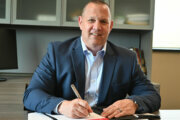For people who not only love their country but also appreciate the virtues of other nations, a career in diplomacy could be a great fit — especially if they have a knack for learning foreign languages.
Diplomacy is a profession that attracts individuals who are patriotic and adventurous, people thrilled by the idea of representing their nation and its people and who feel eager to share the best of their culture with others.
“When I was in college and looking at career opportunities, I had two goals,” says Micaela Schweitzer-Bluhm, a U.S. diplomat-in-residence for the Northwestern United States who is responsible for educating people in that region about job options at the U.S. Department of State. “I wanted a career that was going to let me explore and see the world, but I also wanted a career that was about public service and that was about purposeful work. And when I learned about the foreign service, it just seemed like a perfect marriage of my interests in international affairs and in public service, and I pursued it and have never regretted that choice.”
What Is a Diplomat?
A diplomat is a public official who works on behalf of his or her country and helps to implement its foreign policy. Though diplomats do occasionally work domestically within their own country, they usually are sent to a foreign nation and are based at an embassy or consulate.
[Read: What You Need to Know About Becoming an International Relations and National Security Studies Major.]
There are two diplomat tracks within the U.S. foreign service. Someone can become either a foreign service officer, which involves advocating for the U.S. and its citizens, or a foreign service specialist, who provides critical logistical support for diplomatic operations.
There are five kinds of foreign service officers, including both economic officers and public diplomacy officers, and 19 types of foreign service specialists, including information management specialists and security engineering officers.
U.S. ambassadors oversee all U.S. diplomatic activities within a particular country.
“An ambassador is the U.S. president’s personal representative to a foreign government,” Armand Cucciniello III, a former U.S. diplomat who worked at U.S. embassies in Iraq and Pakistan, explained in an email. “Ambassadors are technically appointed by the President of the United States. For example, the U.S. ambassador to Italy is the personal representative of the sitting U.S. president to the government in Rome.”
Sometimes ambassadors are career foreign service professionals who rose through the ranks to achieve their leadership roles, whereas in other cases they are political appointees.
Duties, Roles and Responsibilities of Diplomats
The work of a diplomat often varies, Schweitzer-Bluhm explains. “There is no typical day in the foreign service.”
However, she suggests that foreign service work usually falls into one of three buckets: interacting with residents of a host country; discussing with government officials how to meet U.S. policy objectives; and sending information back to Washington, D.C., about conditions in the host nation.
One of the core goals of a U.S. diplomat is to establish as productive a relationship as possible between the U.S. and another nation, whether the country is friendly or hostile. “The most important role diplomats play — and their number-one official responsibility — however is looking after American citizens abroad,” Cucciniello says.
For people who intend to join the U.S. foreign service, one key thing to keep in mind is that they will have to move from country to country every few years.
[Read: What Can You Do With a Political Science Degree?]
“Diplomats change jobs — getting posted at a different embassy or consulate — every 2 to 4 years, so expect a lot of globetrotting and racking up frequent flier miles,” Cucciniello wrote. “Diplomats and their families are provided with housing, good schools for children to attend, and other perks that often depend on the location.”
Schweitzer-Bluhm notes that the frequent changes of work assignments mean that diplomats are constantly given the opportunity to learn new skills.
Diplomats have access to numerous State Department professional development programs, and they may take classes at the Foreign Service Institute.
Salaries for diplomats vary widely, depending on their level within the foreign service hierarchy and on whether they are stationed at a location that is considered unsafe or thought to offer difficult living conditions, in which case they will receive extra pay. Pay is also adjusted based on the cost of living in whatever region they are placed. Additionally, diplomats are usually provided government-owned living quarters where they can stay for free or, in the absence of such quarters, a housing allowance to pay for a place.
An individual with a master’s degree who joined the foreign service at a Class 5 Step 5 pay grade, which is typical for someone with that level of education, and who was stationed abroad in 2021 at a location where he or she was entitled to 20.32% locality pay would earn a starting salary of almost $65,000.
Steps to Becoming a Diplomat
Foreign service specialist positions often require a specific type of education or work experience depending on what logistical support the State Department desires, but foreign service officers can come from a wide range of backgrounds. No particular type of degree or work experience is required to qualify for a position as a foreign service officer, explains Yolonda Kerney, a diplomat in residence for the District of Columbia metropolitan region.
Kerney, a former music historian for the U.S. Library of Congress, notes that a person does not need to have a degree in a subject that closely relates to foreign policy in a field like international affairs or law. Although such credentials are common among foreign service officers, other academic degrees could also prepare someone for the foreign service. For example, Kerney has a doctorate in religious studies.
However, there is a rigorous vetting process that includes a written application. Aspiring foreign service officers need to pass an exam, as well. The test is given three times a year and the State Department provides free test prep resources on its website, including a study guide and practice exam.
Future foreign service officers and foreign service specialists who are deemed worthy of serious consideration by the State Department’s qualifications evaluation panel are invited to go on to the next stage of the vetting process: the oral assessment. During that assessment, job candidates must demonstrate that they have the character traits that the State Department seeks in diplomats. They must also pass through a medical screening and security clearance.
A suitability review panel does final evaluations of candidates’ credentials and determines whether they are fit for diplomatic service.
How to Tell if Diplomacy Is the Right Career for You
The State Department offers resources for aspiring U.S. diplomats on its website, including a list of the personal qualities it looks for when evaluating potential foreign service officers and a list of the character traits it seeks in aspiring foreign service specialists, which range from composure to resourcefulness.
The department also provides a quiz to help people gauge whether the diplomatic profession is right for them, noting that the lifestyle of a diplomat isn’t suitable for everyone.
[Read: Fund Your International Curiosity With Foreign Affairs Scholarships.]
“A career with the Foreign Service may appear glamorous: worldwide travel, government-paid housing, generous pay and benefits,” the department website states. “In some instances, though, working as a Foreign Service Officer can be very challenging and sometimes dangerous. … That’s why it takes a special type of person to represent America abroad, to advance diplomatic initiatives to the benefit of both the U.S. and the host country.”
Though knowledge of a foreign language is not mandatory in order to join the foreign service, the ability to pass a language test does increase the odds of securing a foreign service position, since language skills are viewed as a plus. This is especially true if someone is fluent in a language the State Department requires significant assistance with, such as Arabic, Farsi and Mandarin Chinese.
Kerney emphasizes that future diplomats do not have to come from a specific demographic in order to find a place in the U.S. diplomatic corps or to fit in at the State Department.
“We want people to know that they can be themselves — all of their authentic selves,” says Kerney, who notes that she wore a nose ring previously, is African American and has a natural Black hairstyle. “We’re not looking for one type. We’re looking for a foreign service that looks like America, that reflects all of the diversity and all of the multiplicity of what America is.”
Searching for a grad school? Access our complete rankings of Best Graduate Schools.
More from U.S. News
How to Win a Fulbright Scholarship
What You Need to Know About Becoming a Linguistics Major
How to Become an FBI Agent and Why
How to Become a Diplomat and Represent the United States originally appeared on usnews.com







